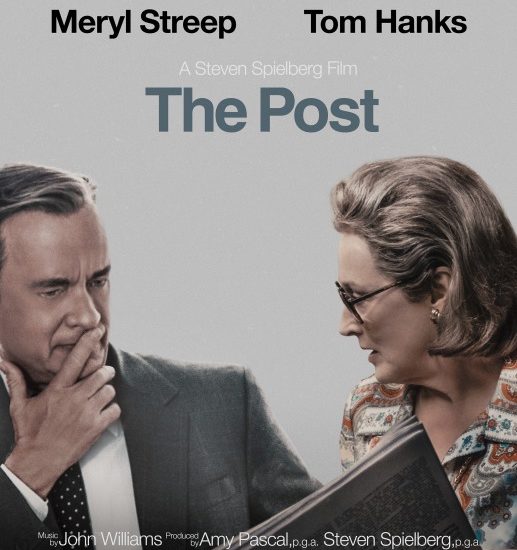Much has been written about THE POST being an incredibly timely film, given its clear parallels to present-day issues involving freedom of the press and political corruption. This cannot be understated. When Barack Obama was in office, movie studios would often send movies like this his way to screen, but we can’t imagine the same can be said for Donald Trump. If he watched this movie he may want to throw something at the screen. In contrast, audiences in NY and Los Angeles have been standing up and cheering at the end of the movie.
This film is razor-sharp storytelling about a period in history that younger generations may not know much about. Director Steven Spielberg has crafted his best movie in quite a few years in this drama about The Pentagon Papers. Specifically, this story is about the ‘Post’ – The Washington Post — and its two leaders who risked everything in a bid to uncover a deep-rooted government cover-up surrounding Vietnam. Whether it’s a cover-up of Vietnam or not, the core part of the story is whether “leaks” should be cause for criminal action and whether a paper and it’s employees are willing to risk incarceration to get the truth out.
Ben Bradlee was the paper’s editor, and Katherine Graham was the publisher. Tom Hanks and Meryl Streep star together for the first time here, and they portray a boss-employee relationship that is polite at best, and incredibly tense at its most difficult moments. Graham, who inherited the paper from her family, was reticent to face off against the White House over the release of classified documents that proved the government lied to the public about its handling of the Vietnam War. One element of the film that is interesting is that it reminds younger viewers that the New York Times actually had the story first. In 1971, it published the first story detailing information from the papers. The Post eventually got a hand on all the documents, but by then the courts had ruled the Times couldn’t publish them because of the sensitive data they contained. The dilemma facing Bradlee and Graham: Do they go against the courts and publish the papers, even though doing so could be viewed as illegal? For Graham, the decision was even more challenging. As the publisher, she risked seeing her family business destroyed, with all its employees caught as collateral damage. Oh, and on top of that, the company was prepping its IPO.
One of the other topics that resonates today, as well as back in the 70’s, is that a female was leading a huge company. Streep brings a restrained approach to her portrayal of Graham. She’s a woman worried about making the wrong decision for many different reasons. This movie is really about Graham, and her role in this. And in the moment where she makes her decision, Streep delivers it not with a big speech or grand flourish .. but matter of factly, with a hint of fear.
Spielberg rushed the film through pre-production because the film’s subject matter practically demanded it arrive in theaters now. You can see the effects of that hurried process a bit in a script that sometimes explains more of what’s going on than it should. There are a few moments where a character will say something that seems like it was designed to get audiences riled up about the current state of affairs in Washington. But the film resists the urge to pander to partisan politics. Instead it focuses on the profession of journalism, how it works and the people deeply invested in it.
Through the rhythms of clacking typewriters and loud, bustling newsrooms, we see the urgency of meeting deadlines and fact-checking, of pre-Internet days of rushing to discreet pay phones to contact sources. We also see from start to finish how a newspaper gets made: From the copy to the proofreading, to the type-setting, and finally, the stacking, loading and delivery of the morning edition. For news geeks, it’s an early Christmas present showing how the sausage used to be made.
The comparisons between The Post and the present-day issues being faced in Washington, D.C. right now, specifically with regards to the Russia investigation, lend the movie unmistakeable currency. But The Post also is a clear reminder of what the role of the press is in a free society — to hold the powerful accountable, and demand the truth, and nothing but.
